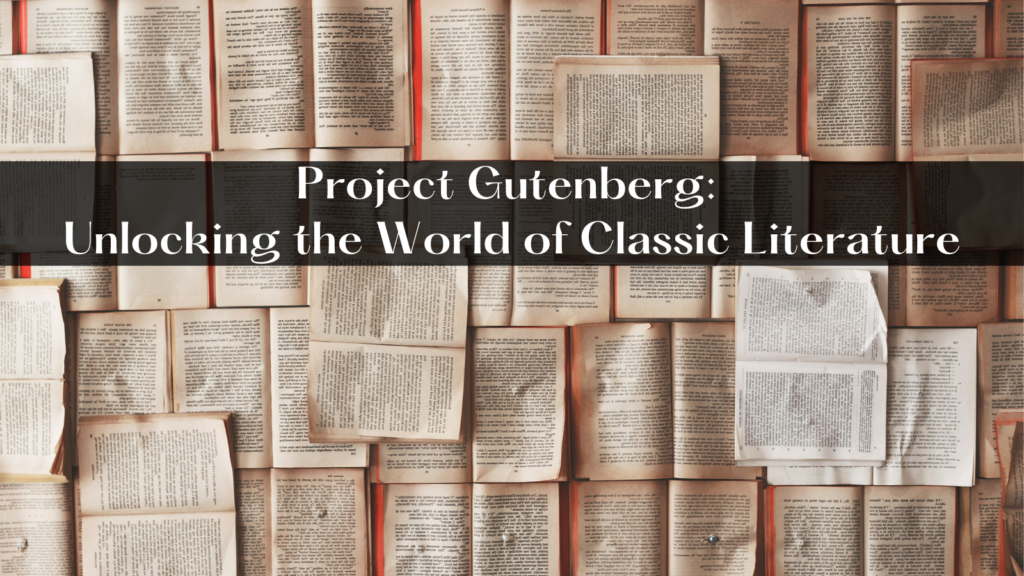By Ashley Rands, Marketing
In the digital age, access to knowledge and literature has become more convenient than ever before. One shining example of this transformation is Project Gutenberg. It is a remarkable website that brings timeless literary works to the fingertips of people around the world.
What is Project Gutenberg?
Project Gutenberg is a volunteer-driven endeavor that aims to make cultural and historical texts, especially classic literature, available to the public for free. Founded by Michael S. Hart in 1971, Project Gutenberg’s mission is to digitize, archive, and distribute cultural works in various forms. Their goal is to ensure that important texts are preserved and accessible for generations to come.
Who Uses It?
Gutenberg is a valuable resource for a diverse range of people. Students, researchers, teachers, avid readers, and really anyone with an interest in literature can benefit from its vast collection of free ebooks. The platform is particularly popular among those seeking to explore classic works that have entered the public domain.
Accessing Project Gutenberg
Accessing books on Gutenberg is incredibly simple. All you need is an internet connection and a device capable of browsing the web. Its website has a user-friendly interface. You are able to browse and search for titles based on authors, genres, languages, and more. Once you’ve selected a book, you can choose from various formats, including HTML, ePub, Kindle, and plain text. This makes it compatible with a wide range of devices. Time to start browsing!
Available Books
Project Gutenberg boasts an impressive collection of over 70,000 books, and the number continues to grow. From timeless classics like Jane Austen’s Pride and Prejudice to philosophical treatises like Plato’s The Republic, the platform covers a diverse range of genres, languages, and time periods. Since many of the works are in the public domain, you can access and download them without any legal restrictions. Can’t say there is nothing to read anymore.
Benefits of Project Gutenberg
The availability of Project Gutenberg to the public brings numerous benefits. It gives easy access to literature, allowing people from different socioeconomic backgrounds to engage with valuable texts. It preserves cultural heritage by digitizing and archiving works that might otherwise be forgotten. Additionally, it fosters education by providing students and teachers with easy access to a wide variety of literary resources. It is indeed a book lover’s paradise!
Drawbacks and Potential Concerns
While Project Gutenberg is undoubtedly a treasure trove of literary gems, there are potential drawbacks and concerns. Some argue that the easy availability of free eBooks could negatively impact authors and publishers, particularly when it comes to modern works.
Another thing that can be concerning is individuals may try selling these books on Amazon or other places as an eBook to make a quick buck. If you are wanting to pay someone for formatting or notes, etc then feel free to purchase it elsewhere. However, these books are available for free download on Gutenberg, oftentimes in many different formats that can fit your needs.
Additionally, there is the challenge of ensuring the accuracy of the digitized texts and handling potential copyright issues for works that might still be under copyright protection in certain countries. But overall, the benefits far outweigh the concerns. Preserving literature is preserving the future.
Adding Books to Project Gutenberg
The process of adding books to Project Gutenberg is collaborative and volunteer-based. Volunteers contribute by digitizing books, proofreading the texts, and ensuring that the electronic versions are accurate and true to the original. Gutenberg operates under a strict set of guidelines to ensure that works added to the collection are in the public domain and free from copyright restrictions. Generally, new submissions to Gutenberg are digitized versions of printed books, most of which were published at least 95 years ago.
Project Gutenberg stands as a testament to the power of technology in preserving and disseminating classic literature. By providing free access to a vast collection of books, it empowers individuals to explore the world of literature, history, and culture. While it comes with its set of challenges, the benefits it offers to education, research, and cultural preservation are undeniable. As we navigate the digital landscape, Project Gutenberg remains a shining example of how technology can bridge the gap between the past and the present. It fosters a love for literature that transcends time and space. Time to go and find some classics to read!
Be sure to sign up for our newsletter for monthly updates.






